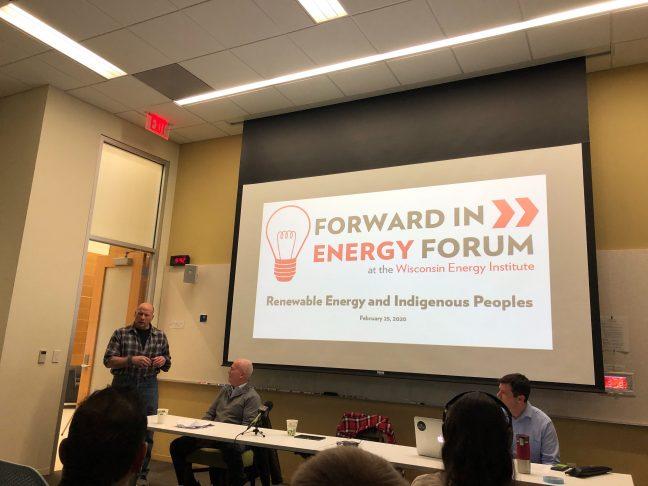The Wisconsin Energy Institute held a panel Tuesday night discussing how indigenous tribes in Wisconsin have been working with renewable energy and the barriers they’ve faced.
The panel included Dylan Jennings, Tribal Council Member for the Bad River Ojibwe; Micheal Troge, Project Manager for the Oneida Nation and Charles Opferman, Vice President of Operations for FCPC Renewable Generation in the Forest County Potawatomi Community.
Opferman said the Potawatomi community was first alerted to the dangers of fossil fuel through fishing. Coal-fired power plants caused Walleye in their community and across the country to contain mercury.
New Solar energy warehouse adds to renewable energy efforts in Wisconsin
This tainting of natural resources due to fossil fuels does not stop at fish, Jennings said. The Bad River Reservation has been working to protect its resources for generations.
“We very much see our home as paradise,” Jennings said. “So talking about innovative ways to work with renewable energy and to conserve and basically pass down this place as best as we possibly can is what we strive to do as a community.”
The Bad River tribe is currently working on establishing a solar field that will power their health and wellness center as well as their wastewater facility, Jennings said.
The Forest County Potawatomi Community has three solar campuses and one includes a solar-powered RV park, according to Opferman, who said these parks are part of an effort to make the Potawatomi community energy sovereign.
Troge said the Oneida signed up as an energy-independent community about 10 years ago, but due to economic barriers they currently produce only 3% of their energy. To be considered energy independent, a community must produce 25% of their energy.
Cost is a huge barrier in pursuing renewable energy. Jennings said grants and funding opportunities are rare and highly competitive.
Energy Institute kicks off national clean energy week with panel on energy innovation
This potential renewable energy funding also gets eaten up by other issues, Jennings said. Many tribes like the Black River Band have had to take the lead on fighting off large fossil fuel corporations — like the current battle over Enbridge’s Line 5 pipeline route.
“Our tribal communities are picking up those fights on behalf of the area and the state,” Jennings said. “Our first treaties are with everything in creation and all the orders of creation and so we have an obligation to protect and take care of the environment.”
Troge ended the panel by saying renewable energy will be one of the many adaptations we will need to make in the face of climate change.
Troge said the motivation for this transition may not come soon enough.
“There’s just too much money to be made in this behemoth of an economy that we built for ourselves and that transition is not gonna happen,” Troge said. “Like anything else, it’s gonna take a crisis.”












